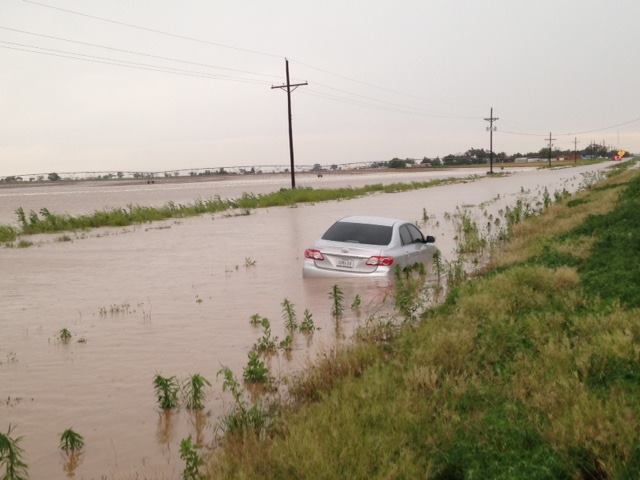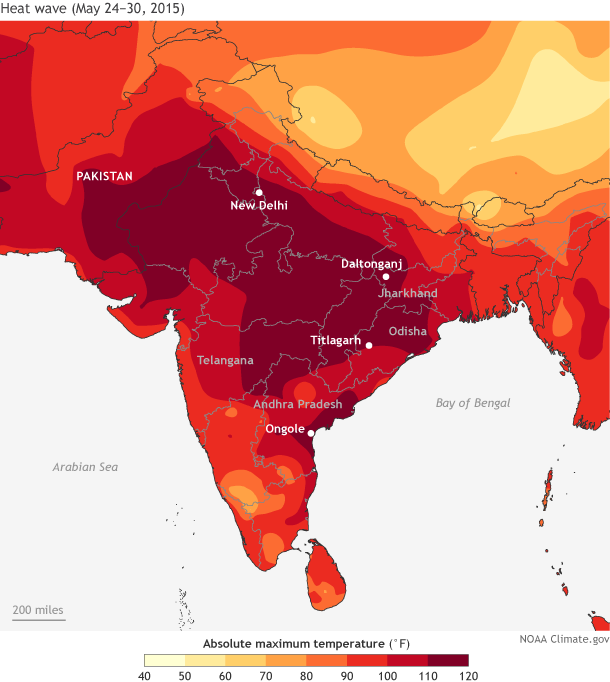
Texas, the second most populous U.S. state and India's capital Delhi may lie in two different continents and over 8,300 miles apart. But over the past few weeks, both have made headlines for the same reason - extreme weather. The only difference is that while Texas is being inundated with torrential rains, Delhi has been experiencing a heat wave so severe that it is melting the roads.
Texas, USA

Similar to California, Texas has been experiencing a severe drought for the last five years. However, that changed over the Memorial Day weekend when a series of thunderstorms and tornadoes swept through a wide swath of area, wreaking havoc to communities all the way from Mexico to Iowa. Among the worst hit was the small Mexican border town of Ciudad Acuña, which suffered extensive damage after a rare but ferocious tornado rammed its way through, killing thirteen residents.
While the twister did not impact Oklahoma and Texas, the heavy rain brought many cities to a near standstill. Houston, which received 11-inches, most of it on Memorial Day, was particularly impacted thanks to the overflowing of the 2,500 miles of bayous or waterways that meander through the city. The severe weather left thousands without power, damaged over 4,000 homes and 2,500 cars, and resulted in seven deaths.
Though this storm system that prompted a rare 'rain' day closure for many schools on May 26th, is being billed as epic, the city of Houston has experienced worse. In 2001, Tropical Storm Allison dumped 32 trillion gallons of water, damaging 73,000 homes and over 95,000 cars and trucks. Thirty residents lost their lives.
Though the worst seems to be over for Houston at least, for now, another severe storm system is currently sweeping through Dallas, prompting officials to issue flash flood warnings. The only silver lining is that with Texas receiving almost 35 trillion gallons of water or enough to cover the entire state in 8-inches of water just in May, the drought is officially over.
Delhi, India

The month of May is always a scorcher in India. However, according to EM-Dat, The International Emergency Disasters Database, this year's heat wave is so severe that it will go down in record books as second-deadliest in India and the fifth in the world!
Though the entire Indian subcontinent is suffering, the worst hit are the southern states of Andhra Pradesh, Telangana, and Odisha, where temperatures have reached as high as 117°F (47.7°C). Things are not much better in the north where Delhi is situated. On Wednesday, May 27th, the 112° F (44.4°C) temperatures experienced in the Indian capital resulted in melting the asphalt road surfaces in certain areas.
Government officials have been urging the residents of the most severely affected areas to stay indoors, especially between 11 am and 4 pm when the temperatures are the highest. However, it is hard to do in a country where 29% of the people live below the poverty line. So far, over 1,800 people have succumbed to the heat. While some of the victims are elderly or homeless, may farmers and minimum wage construction workers that survive on daily income have also lost their lives while trying to eke out a living.
Fortunately, there is some relief on the way. According to meteorologists, the much-awaited monsoon rains will arrive in the southern Indian state of Kerala by next week and then gradually make their way north. For the residents of the subcontinent, it cannot happen soon enough!
Resources: cnn.com, news.yahoo.com,nationalpost.com,npr.com